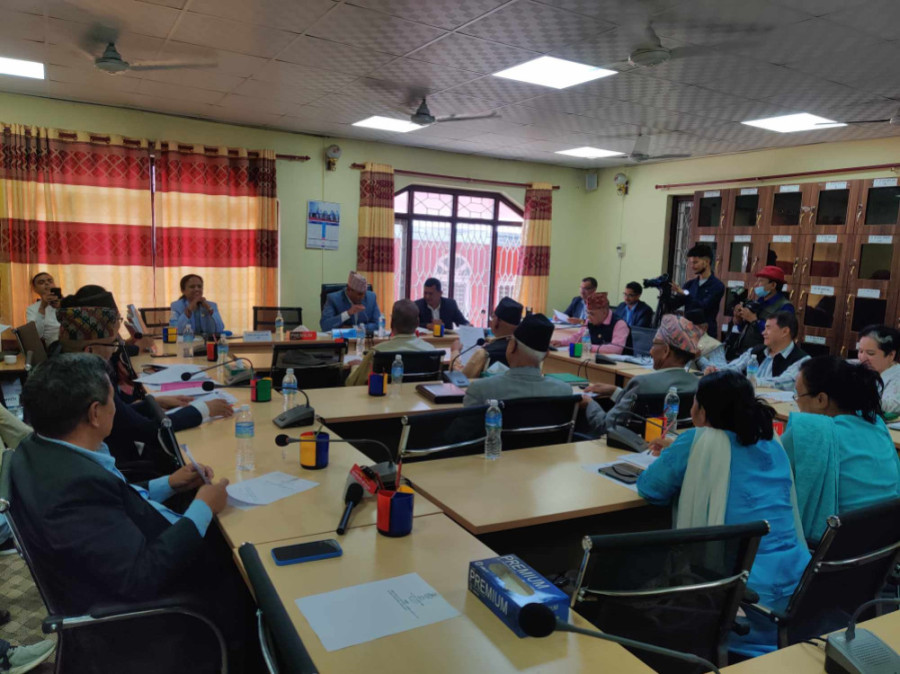Politics
Bill giving PM decisive vote in Constitutional Council moves ahead
House panel passes the provision after the UML, which opposed need for prime minister’s consent, backtracked.
Post Report
The State Affairs and Good Governance Committee of the House of Representatives on Thursday endorsed a bill to amend the Constitutional Council (Functions, Duties, Powers and Procedures) Act unanimously after the CPN-UML backtracked on its earlier position.
As per the amendment, the council can make its decision only with the agreement of the prime minister and a majority of the existing members. The Pushpa Kamal Dahal government in February last year had registered the amendment bill proposing that the six-member council nominate office-bearer candidates for constitutional bodies with the approval of its chairperson and at least half of the existing members—or four members in total.
While other parties had no reservation on the bill, the UML had been demanding that a majority of the council should be allowed to make decisions, with or without the chairperson’s approval. It had stood against the provision requiring the prime minister's consent for decisions.
The largest party in the ruling alliance softened its position at Thursday's meeting, leading to a unanimous decision on the bill. It changed its position as it is now in the government unlike last year when it was the main opposition.
“The bill was endorsed unanimously,” said Ram Hari Khatiwada, chairperson of the committee. Now the bill will be presented in both Houses for endorsement. As the lower house panel endorsed it unanimously, it is most likely to be endorsed in the ongoing session of Parliament.
As per the Constitution of Nepal, the council is headed by the prime minister. The chief justice, Speaker of the House, National Assembly chair, leader of the main opposition and deputy Speaker are its members. The Minister for Law, Justice and Parliamentary Affairs takes the seat when the council nominates a candidate for chief justice.
A clause in the bill says the council meets to take decisions unanimously. If that is not possible, “the meeting shall be deemed to have the required strength if the chairperson and at least 50 percent of the members are present,” reads the amendment bill.
Currently, the chairperson and four members of the council must be present to convene its meeting. However, a majority of the total can take the decision if there is no unanimity. If the present bill is endorsed the prime minister's consent is necessary including an agreement of 50 percent of the remaining members for the decision.
In the six-member council, the prime minister and the National Assembly chair Narayan Dahal come from CPN (Maoist Centre). Speaker Devraj Ghimire was elected in the position from the UML quota while deputy Speaker Indira Rana was elected under Rastriya Swatantra Party quota. Sher Bahadur Deuba, the Nepali Congress president, is a leader of the opposition.
As per the bill each member of the council should be informed about the meeting 48 hours in advance and a member will have to inform before 24 hours if they cannot participate.
In addition to the chief justice, the council has the authority to nominate chairpersons and members of various constitutional bodies.
The KP Sharma Oli administration in December 2020 revised the Act through an ordinance, making it possible for the chairperson and two members to recommend the names. As many as 52 persons were appointed chairpersons and members of various constitutional bodies based on the recommendations of the Oli-led council while Ganesh Timilsina, then chair of the upper house, and then chief justice Cholendra Shumsher Rana lent their support. Agni Sapkota, then Speaker and Deuba, then leader of the opposition, had skipped the meeting.
The Congress and the Maoist Centre had at the time fiercely criticised the move, which has also been challenged in court.




 11.78°C Kathmandu
11.78°C Kathmandu












